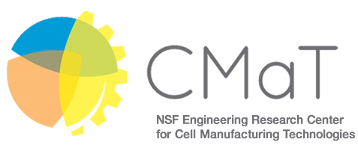Research Centers
NSF Engineering Research Center for Cell Manufacturing Technologies (CMaT)

UPRM Site Leader: Madeline Torres-Lugo (co-PI)
INQU Researchers: Maribella Domenech
For more details about this grant visit the National Science Summary for Award Abstract #1648035.
Cell-based therapies could revolutionize treatments of unsolved and chronic medical conditions, thus making a transformative impact on global health and economy. Despite numerous clinical trials and growing industry commitment, no concerted effort has been made to enable scalable manufacturing of therapeutic cells as an effective, safe, reproducible, and affordable product with standardized characterization, and quality control. This has hindered broad translation of cell therapies into clinical and industrial practice. To overcome this, the engineering community must develop new tools and technologies to reproducibly manufacture high-quality cells at large-scale and low-cost; enable robust supply-chain, storage, and distribution logistics; and train a diverse cell-manufacturing workforce. The proposed ERC for Cell Manufacturing Technologies (CMaT) is a national, comprehensive, convergence-science effort where engineers will work closely with industry partners, clinicians, biologists, workforce experts, as well as standards and regulatory agencies to transform the production of therapeutic cells into a large-scale, low-cost, reproducible, and high-quality engineered manufacturing process. Georgia Tech is the lead university of CMaT. The University of Georgia, University of Wisconsin-Madison, and University of Puerto Rico-Mayaguez are major partners, alongside several affiliate institutions. CMaT will have broad and lasting societal impact: producing new fundamental knowledge and transformative technologies, building an inclusive workforce, nurturing a nascent industry, and improving healthcare. It will be an internationally recognized exemplar center with state-of-the-art facilities and equipment, an embedded culture of innovation and inclusion, and will engage deeply and broadly in education and workforce development through a comprehensive program involving under-represented students and teachers from high schools, students with disabilities, veterans, technical and community college students, as well as undergraduate and graduate students.
The CMaT team recently led the development of an industry-driven, 10-year national roadmap for cell manufacturing that provides a prioritized pathway for critical technology development. CMaT will be a natural venue for implementing this roadmap. Scalable manufacturing of high-quality therapeutic cells poses complex challenges, different from those currently experienced by industry. First, the product is a “living” entity whose properties can change with every manipulation requiring a whole new paradigm for large-scale manufacturing and quality-control. Second, little is known about the Critical Quality Attributes (CQA) of therapeutic cells, i.e. measurable biomarkers that render them safe and effective for specific disease indications in patients and how to measure them. Third, little standardization exists across the field. Thus, Quality-by-Design (QbD), a fundamental premise of current manufacturing practice, has not been implemented in cell manufacturing. To enable these, CMaT will innovate transformative tools, technologies, and methods using three Engineered Systems (Test-Beds): (a) Mesenchymal Stem/stromal Cells for immune-modulation and musculoskeletal regeneration, (b) T cell immunotherapies for cancer, and (c) induced Pluripotent Stem Cell-derived cardiac cells to treat heart diseases. In each of these systems CMaT will develop (a) new omics-based tools that couple big-data analytics and modeling to identify CQAs for safety and efficacy prediction; (b) novel cell-process sensors to measure quality attributes, both at the initial starting point and throughout the manufacturing process, and ensure well-defined, reproducible and high quality cells for therapy; (c) new scale-up and scale-out technologies with integrated quality control; (d) efficient cell purification and separation technologies that maintain cell purity, yield, and quality; (e) high throughput methods for rapidly validating function, potency and safety of manufactured cells; and (f) critical industrial-design principles, automated closed-system manufacturing, and supply-chain modeling to lower cost, ensure reproducibility, and enable scalable production.
For more information visit the Center’s webpage.
Wisconsin – Puerto Rico Partnership for Research and Education in Materials [Wi(PR)2EM]

Ubaldo Cordova (Principal Investigator), Nelson Cardona-Martinez (Co-Principal Investigator)
INQU Researchers: Yomaira Pagan-Torres, Claribel Acevedo-Velez, Arturo Hernandez-Maldonado, Aldo Acevedo-Rullan
For more details about this grant visit the National Science Summary for Award Abstract #1827894.
Non-technical Summary:
The mission of the Wisconsin – Puerto Rico Partnership for Research and Education in Materials [Wi(PR)2EM] is to make transformative advances on a range of materials-enabled technologies, and to do so while broadening participation of Hispanic Americans in science, technology, engineering and mathematics (STEM) fields. Wi(PR)2EM will achieve these goals by developing synergies between research and educational outreach at University of Wisconsin – Madison (UW) and three campuses of University of Puerto Rico (UPR) (Mayaguez (M), Medical Sciences Campus (MSC) and Rio Piedras (RP)), with a particular focus on leveraging resources of UW’s Materials Research Science and Engineering Center (MRSEC) to achieve sustainable collaborations. Wi(PR)2EM will also leverage its multidisciplinary and multicultural research teams to develop a series of research-inspired programs that collectively define a pathway that recruits, retains and advances people from all stages of the pipeline (K-12 through faculty) into STEM fields throughout Puerto Rico and Wisconsin, with a focus on Hispanic Americans and women. This pathway emphasizes mentoring across the entire scope of the partnership at UPR and UW, which will be promoted through a carefully coordinated series of trainings and experiences. The proposed education and outreach activities leverage and build upon STEM outreach programs developed by the UW MRSEC Interdisciplinary Education Group and the internationally acclaimed UPRM Science on Wheels Educational Center. The PREM will expand the breadth of opportunities for K-12, undergraduates, graduate students, postdocs, and faculty at both institutions, as well as the public in surrounding communities, with the long-term goal of creating a diverse and creative STEM workforce.
Technical Summary:
Wi(PR)2EM combines the shared vision and expertise of UW and three campuses of UPR to form multidisciplinary and multicultural teams that will make transformative advances in research involving a diverse range of materials. The three interdisciplinary research teams (IRTs) of Wi(PR)2EM bring together deep and complementary expertise in the synthesis, characterization, modeling and application of multifunctional materials. The teams will pioneer fundamental advances in atom-scale materials design and understanding, including atomically controlled bimetallic nanostructures and nano- or mesoporous materials for catalysis and separations (IRT1); amorphous and crystalline pharmaceutical materials templated from designer polymers (IRT2), and active and reconfigurable liquid crystalline soft materials (IRT3). The teams also integrate collaborators from national laboratories and industry. The long-term technological impact of the research to be pursued in Wi(PR)2EM is enormous, including nanostructured materials for chemical transformation of sustainable biological feedstock into commodity chemicals, new formulations of small and large molecule pharmaceutically active materials, novel chemical and biological sensors and assays, and hierarchically structured materials for separations.
For more information visit the Center’s webpage.
RII Track-2 FEC: Center for a Sustainable Water, Energy, and Food Nexus (SusWEF)

Nelson Cardona-Martinez (Principal Investigator), Juan Lopez-Garriga (Co-Principal Investigator)
INQU Researchers: Yomaira Pagan, Arturo Hernandez
For more details about this grant visit the National Science Summary for Award Abstract #1632824.
Non-technical Description
The project addresses the food-energy-water nexus for agriculture in the collaborating jurisdictions (PR and SC). Experimental and computation methods will be combined to better understand biomass deconstruction, the use of lignin for soil improvement, and to develop separation technologies for water treatment. The anticipated outcomes will lead to more sustainable agricultural practices, improved energy efficiency and soil and water quality. A comprehensive suite of education and outreach activities will provide training for K-12 teachers, research experiences for undergraduate and graduate students, and mentoring for early career faculty. These programs will recruit underrepresented minorities and women and broaden their participation in STEM (Science, Technology, Engineering, and Mathematics) fields.
Technical Description
This project will support complementary, collaborative research between the University of Puerto Rico Mayaguez (UPR) and the University of South Carolina Columbia (USC) to address fundamental issues in biomass deconstruction, catalysis, lignin, and membranes separation technology for engineering improved agricultural sustainability. UPR will perform bottom-up design of nanostructured catalysts for targeted transformation of biomass waste into value added chemicals as well as the study of soil amendment using lignin. USC will focus on the development of advanced composites and membranes to remove contaminants of emerging concern from irrigation water.
For more information visit the Center’s webpage.
Center for the Advancement of Wearable Technologies (CAWT): Engineered (Bio)Interfaces, Energy Harvesting/Storage and Data Analytics for Health and Diagnostic Monitoring
Center Director: Arturo Hernandez-Maldonado (Principal Investigator)
UPRM Site Leader: Madeline Torres-Lugo (Co-Principal Investigator)
INQU Researchers: Maribella Domenech, Ubaldo Cordova
For more details about this grant visit the National Science Summary for Award Abstract #1849243.
This project aims to build significant research capacity in Puerto Rico (PR) in the wearable technology field by forming the Center for the Advancement of Wearable Technologies (CAWT). The center will build on the research capacity developed by prior nanoscience research activities funded by the NSF Established Program to Stimulate Competitive Research (EPSCoR) and managed by the PR EPSCoR office. CAWT is structured around three goals: 1) advance the fundamental and applied science of biosensors, portable power and storage, and data analytics; 2) provide an engaged and diverse workforce for the nation’s wearable technology sector; and 3) stimulate economic development together with PR’s medical device industry. PR EPSCoR will utilize a rich network of academic, industry, and government partnerships to access state-of-the-art equipment, research opportunities for trainees and build a robust innovation ecosystem. The project will also leverage established infrastructure in PR for education, outreach, workforce development activities to make significant strides towards developing a diverse, next-generation STEM workforce that is well-aligned with the science priorities of the jurisdiction.
PR EPSCoR will build a Center for the Advancement of Wearable Technologies (CAWT) to leverage the jurisdiction’s research strengths in nanotechnology towards advancing the wearable technology field. Providing easy access to new types of wearable devices that sense and monitor health conditions and provide consistent, reproducible, and personalized medical information is essential for continued growth within the wearable technology sector. Wearable devices face three fundamental research and development challenges: 1) ensuring that functional components made of materials that are fully compatible with end users; 2) generating adequate and lasting power; and 3) updating data analytics to utilize and manage steady streams of data generated wearable devices. The CAWT motivates its research agenda by these challenges and is thus organized into three Interdisciplinary Research Groups (IRGs). IRG1 focuses on the design of optical and electrochemical sensors, micro fluids platforms, and characterization studies of materials components that come in direct contact with biological materials. IRG2 aims to harness existing low-level energy sources to drive low-power wearable devices and investigate new multicomponent battery materials. IRG3 aims to develop big data tools to address materials design problems and support the experimental design of projects within IRG1 and IRG2. The CAWT seeks to build a research agenda that creates novel and sustainable research lines while also building up a workforce that can address needs within the local medical device industry. This project will realize PR EPSCoR’s goal of building research capacity, advancing scientific discovery in wearable technology, developing a well-trained and diverse scientific workforce, and promoting economic development throughout the region.
For more information visit the Center’s webpage. (link here)
